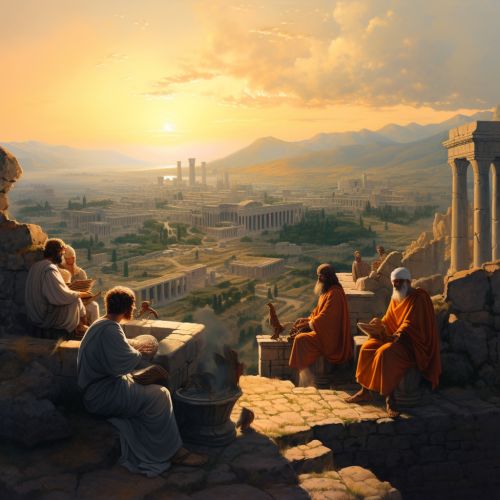Milesian School
Origins and Overview
The School of Miletus was a group of early Greek philosophers who lived in Miletus, a city of Ionia. The school was active in the 6th century BC and is renowned for being the first to seek rational explanations of the natural world, marking a definitive shift from mythological to scientific thinking. This school of thought is considered the starting point of the Western philosophical tradition.


Principal Figures
The three main figures of the Milesian School were Thales, Anaximander, and Anaximenes. They are often referred to as the first philosophers in the Western tradition due to their break from mythological explanations of the world, and their pursuit of knowledge through observation and reason.
Thales
Thales (c. 624 – c. 546 BC) is often considered the first philosopher in the Greek tradition. He proposed that water is the originating principle of nature, the substance from which all things emerge and to which they return. Thales is also known for his innovative use of geometry, and his prediction of a solar eclipse.
Anaximander
Anaximander (c. 610 – c. 546 BC) was a student of Thales. He proposed that the 'apeiron' or 'the boundless' was the source of all things. Anaximander is also known for his work in cartography and his cosmological theory of the 'apeiron'.
Anaximenes
Anaximenes (c. 586 – c. 526 BC), a student of Anaximander, proposed that air or mist was the source of all things. He is known for his belief that qualitative changes in the natural world occur through the rarefaction and condensation of this primary substance.
Philosophical Concepts
The Milesian School is known for introducing the concept of 'arche', the originating principle or element, a concept that would become a fundamental assumption in later philosophical inquiries. Each of the Milesian philosophers had a different interpretation of what the 'arche' was, but their shared belief in its existence set a new direction for philosophical thought.
Legacy
The Milesian School's emphasis on observation and rationality laid the groundwork for the scientific method. Their inquiries into the nature of physical reality set a precedent for future philosophers and scientists, making them crucial figures in the history of Western thought.
